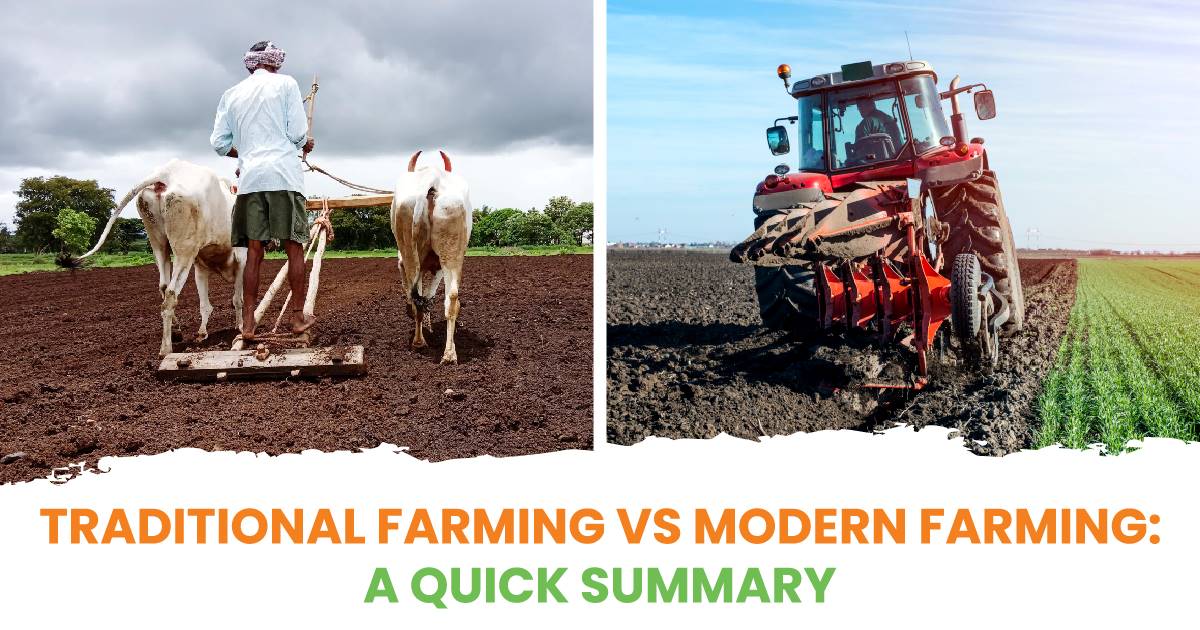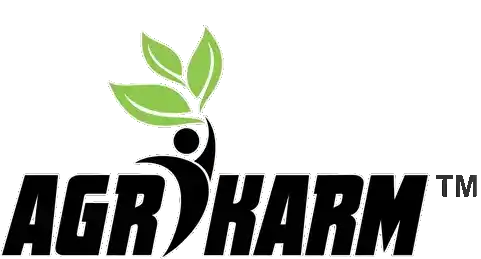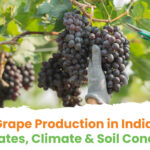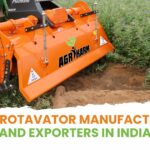
Many types of farming in India are being practiced mainly disguised as traditional farming and modern farming.
Traditional Farming refers to agricultural practices that have been passed down through generations, often characterized by the use of simple tools, natural methods, and local knowledge. These practices are typically based on a deep understanding of the local environment, including the climate, soil and biodiversity.
Modern Farming, also known as modern agriculture, is the application of scientific, technological and innovative practices to enhance the efficiency, productivity and sustainability of agricultural activities. It represents a significant evolution from traditional farming methods, integrating advanced techniques to meet the growing demands of the global population.
Traditional farming and modern farming differ significantly in their methods, tools and overall approach to agriculture.
Let’s go through a quick summary of the differences for traditional farming vs modern farming.
Methods and Techniques
Traditional Farming:
- Relies on manual labor and simple tools like plows, hoes, and sickles.
- Crop rotation, mixed farming, and organic manure are common.
- Farmers often depend on natural rainfall and traditional irrigation methods.
- Practices like shifting cultivation or slash-and-burn agriculture are used.
Modern Farming:
- Utilizes advanced machinery like tractors, harvesters, and seed drills, rotavators which reduce labor and increase efficiency.
- Implements scientific techniques such as genetic engineering, precision farming, and the use of synthetic fertilizers and pesticides.
- Controlled irrigation systems like drip irrigation and sprinklers are common.
- Emphasizes monoculture (growing a single crop extensively) and high-yield varieties.
Agrikarm’s rotavators helps you perform the techniques easily.
Inputs
Traditional Farming:
- Uses natural resources such as organic manure, compost, and seeds saved from previous harvests.
- Low reliance on external inputs, with most resources sourced from the farm itself.
Modern Farming:
- Relies heavily on external inputs like synthetic fertilizers, chemical pesticides, high-yield seeds, and genetically modified organisms (GMOs).
- Involves significant use of irrigation systems, chemical treatments, and modern tools.
Environmental Impact
Traditional Farming:
- Generally has a lower environmental impact due to the use of natural inputs and sustainable practices.
- Maintains soil fertility and biodiversity through crop rotation and mixed farming.
- Lower carbon footprint due to minimal machinery usage.
Modern Farming:
- Can lead to soil degradation, water pollution, and loss of biodiversity due to intensive use of chemicals and monoculture practices.
- High energy consumption due to machinery and synthetic inputs, leading to a larger carbon footprint.
Productivity and Efficiency
Traditional Farming:
- Lower productivity and efficiency, as it depends on manual labor and traditional practices.
- Smaller-scale production, often sufficient for subsistence farming.
Modern Farming:
- Higher productivity and efficiency due to advanced technology and scientific methods.
- Large-scale production aimed at meeting commercial demands and global markets.
Agrikarm provides you with the best kinds of rotavators that are equipped with advanced technology to help you gain higher productivity.
Economic Aspect
Traditional Farming:
- Often practiced by small-scale farmers with limited capital.
- Lower cost of inputs but also lower profits due to smaller yields.
Modern Farming:
- Requires significant investment in machinery, chemicals, and technology.
- Higher input costs but also higher potential profits due to increased yields and efficiency.
Social and Cultural Impact
Traditional Farming:
- Deeply rooted in cultural and community practices, often passed down through generations.
- Involves the whole community and supports local traditions and knowledge systems.
Modern Farming:
- Can lead to the decline of traditional practices and knowledge.
- More individualistic and commercially driven, potentially disrupting rural communities.
Sustainability
Traditional Farming:
- Generally more sustainable in the long term due to its reliance on natural cycles and minimal external inputs.
- Focuses on maintaining ecological balance.
Modern Farming:
- Faces challenges in sustainability due to resource-intensive practices, but efforts are being made to adopt sustainable farming techniques through innovations like organic farming, precision agriculture, and conservation practices.
FINAL VERDICT
Traditional farming is characterized by sustainability, low environment impact and cultural significance, while modern farming is driven by technology, efficiency and productivity but comes with higher environmental and economic costs. Both the types of farming in India are being practiced by farmers and taken advantage of as their resource availabilities.
Contact us for more information about varied forms of rotavators.


 Admin
Admin 

